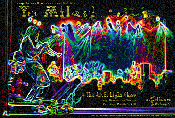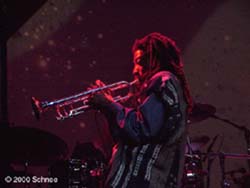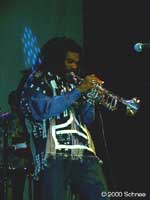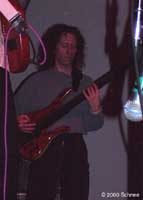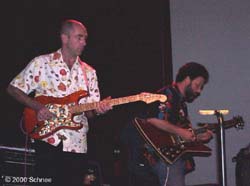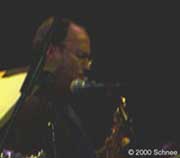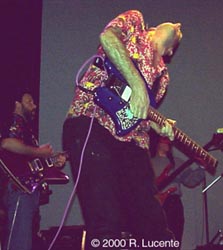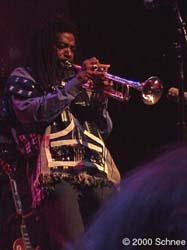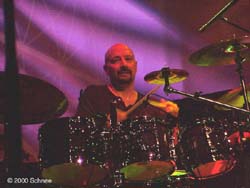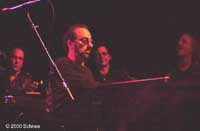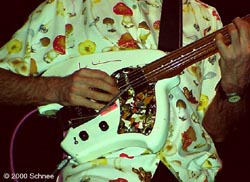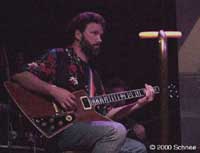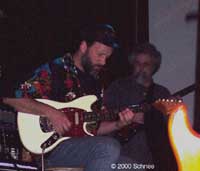|
HK:
Initially, I was thinking of doing it just with guitars without
a trumpet because I didn’t think there was a trumpet player that
could do it or would want to do it. 1972 to 1975 is not usually
a particularly popular period with jazz musicians. I had known
Wadada Leo Smith for twenty years and I was at a solo concert
of his in Oakland where he was playing so great and I said, "Hey,
I’m gonna do this project of this Miles stuff" Leo
is a monster on trumpet. That guy is 59 years old, he’s the head
of Afro-American Studies Department at Cal Arts down in Southern
California, and he’s had this long career – growing up in Mississippi,
being in the Army band, moving to Chicago, joining the AACM (the
militantly black, Association for the Advancement of Creative
Music), and Our
great bass player, Michael Manring, learned all the bass PZ: When did you grab Steve Kimock’s attention for the Yo Miles! project? HK:
Steve loves electric Miles Davis stuff and he heard what we
did and he really liked it. I said, "We’re doing a gig down
at the Fillmore – why don’t you come and be in the band PZ: You did it great justice – that music just needs to be heard. HK:
Yeah, but I don’t feel so much like that specifically is the music
that needs to be heard. I think that peoples’ minds need to be
expanded and Miles in that period PZ: How do you guys rehearse for such a thing? HK: There’s no rehearsing. The point of the music is not to do that. Just as in Miles’ band, it’s a very collaborative thing and everybody brings something to it. It’s a very open thing and anything can happen.
HK: Well, it’s an expensive thing to have a band with nine or twelve people and people that are really good players at that. We’re all very much into it, but it’s not like we can afford to go out on tour or play in clubs or take it to New York and play at the Wetlands or something like that. But we can play at jazz festivals in Europe and America and Japan, in our hometown where we can build a bigger audience and where many of us live – like at the Fillmore twice a year, or Yoshi’s for a few nights. We had a very enthusiastic response after this last gig and have had a lot of requests to do some festivals. We discussed how we could make the next Yo Miles! album different – we don’t want it to be just like the last one. The guys in the band were really enthusiastic about it. Steve Kimock and Tom Coster [Tom Coster (Yo Miles! keyboardist) and Steve Smith (Yo Miles! drummer) have their own band Vital Information] were talking to me from the car phone on their way in between gigs about it – everyone’s really excited.
Leo was talking to me on the phone saying, "We follow the logic of the pieces a lot but we’ve gotta break that logic up more and just do something crazy all of a sudden, and someone’s gotta come in and interrupt someone else because Miles would do that." He would establish the logic of a piece and then he would destroy it (in that period) in a way that you couldn’t do in jazz or in fusion. Leo’s right – we need to challenge the music. Now we’re in touch with it, and we've survived its initial challenges, but now we need to challenge it back. PZ: The Yo Miles! studio CD that is out – did you take the same approach as you did on-stage?
PZ: I take it you’ve seen Miles Davis play live?
PZ: Do you have any other projects you’re currently working on? HK: Well, I always have too many projects. There are six albums I’m mixing now – one with some Japanese musicians, one with a great musician, Mike Keneally (guitar and keyboard player who was with Frank Zappa), one project with Captain Beefheart’s old drummer, Drumbo, John French, who I’ve known for years, Michael Manring and myself that we’re working on finishing up now. I just recorded a CD with an amazing guitar player, Tisziji Muñoz. (check out his website at www.tisziji.com) He's kind of a Coltrane guitarist, and we had Marilyn Crispell, Lukas Ligeti and Mark Dresser in the band. So many CDs to mix! I’m behind schedule and I have so many records to finish and I’m not playing too many other live gigs now. PZ: You’ve worked on so many albums... HK: I’m at a point in my musical career where I’ve made about 160 or 170 different records and I’ve done a lot of the things that I wanted to do and I’m getting older now. I’m 47 – and it’s not that fun going out on the road most of the time. So, I want to keep doing different kinds of new projects and things, so there probably won’t be as many live gigs in the future. PZ: I know this is a tough question, but out of all the albums you’ve worked on, are there any gems that really stand out? HK:
My favorite things are the records I made with David Lindley in
Madagascar and Norway. I’m very proud of those – A
World Out Of Time and The
Sweet Sunny North (hear
samples). There’s so many records – that’s a tough question
to answer. Those are also among the best sellers too. There’s
people I really enjoy working with. I really like the work I’ve
done with Richard Thompson, and then I really enjoy playing crazy
experimental
improvisation like I’ve done with people like Derek Bailey
(our duo CD: Wireforks,
is another personal favorite). I really enjoy playing psychedelic
guitar because I PZ: Is there anyone specifically you’d like to work with that you haven’t already? HK: Well, I’m always working that. I always find the people that are big heroes of mine that I’d like to work with. All the people that I am a fan of, I would dream of working with. PZ: You’ve collaborated with Steve Kimock quite often, what’s the history behind your relationship? HK:
Many years ago, Mark Margolis was doing a benefit at the Ashkenaz
here in Berkeley, and I had not heard Zero or Steve Kimock, although
I had read about them in the paper. Mark had asked me to come
and play as part of Zero that PZ: You mentioned that you were working on an instructional video with Steve? |
